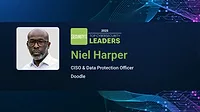Special Report
Dr. Ryma Abassi | Top Cybersecurity Leaders 2024
Embedding cybersecurity into all levels of education

Background image / DamienGeso / iStock / Getty Images Plus via Getty Images — Headshot courtesy of Abassi
Dr. Ryma Abassi’s security introduction came through a love of science when she was a girl. She was a successful student across subjects, making the decision regarding her future a challenging one. Like many Tunisians, her original university options were to go into either medicine or engineering. The National Institute of Applied Science caught Abassi’s eye, inspiring her decision to become a computer science and network engineer.
“I wanted a job that’s challenging, where each day is different, and I can let my creativity shine,” Abassi says. While attending university, Abassi fell in love with learning about network functions and code.
“Then came the day we had our first cybersecurity course, and everything clicked. Initially, I was fascinated by hacking techniques and attacks, like anyone would be. However, as I delved deeper, I realized that cybersecurity is essential in various fields like healthcare, finance, homes, cars, cities, transportation and more,” Abassi says.
Building the Cybersecurity Center of Excellence
Currently, Abassi serves as the Director of the Higher Institute of Technological Studies in Communications of Tunis (ISET’Com), the first woman to hold the position. Abassi initially joined the company as an Associate Professor, teaching cybersecurity courses before her appointment to Associate Director and Director.
“As Director, my strategic vision is unequivocal: to enhance the institution’s influence both nationally and internationally. This ambitious goal entails elevating the quality of training programs and fostering new collaborations with highly recognized industries and universities. It was with this objective in mind that the concept of the Cybersecurity Center of Excellence took shape,” Abassi says. The Cybersecurity Center of Excellence aims to promote innovation, collaboration and information sharing. It is the only cybersecurity center of excellence in Africa.
The process of establishing the center was a collaborative one. Abassi and her team had a vision for what a dedicated center for practical cybersecurity training could do for their university and the community. They pursued funding and government support, and the center was established in October of 2022.
“I am immensely proud of the strides we have made, and I remain dedicated to steering ISET’Com towards greater heights of excellence and influence in the dynamic landscape of cybersecurity education,” Abassi says.
Balancing education and administration
In her daily life, Abassi balances her work as a director, a professor and a researcher. Her mornings consist of administrative duties and collaboration with department heads before transitioning into teaching her students. Abassi teaches several cybersecurity courses where she leads students through practical applications.
“Simultaneously, my role as a researcher demands dedicated time for scholarly pursuits. This involves staying abreast of the latest developments in cybersecurity, conducting research, and collaborating with fellow researchers both within and outside the university. Additionally, staying updated on the rapidly evolving field of cybersecurity poses a continuous challenge, necessitating a commitment to ongoing learning and adaptation,” Abassi says.
As the ISET’Com Director, one of Abassi’s primary goals is to foster a “positive and collaborative” university culture. She makes it a priority to address concerns and promote a policy of open communication between faculty, staff and students. Abassi also works to ensure the students feel challenged in their learning.
“Introducing cybersecurity into the academic curriculum is essential to prepare students for the evolving digital landscape and the increasing threats in the cyber domain. One of the main challenges has been staying abreast of the rapidly changing cybersecurity landscape to ensure that our educational programs remain relevant and effective,” Abassi says. A challenge Abassi faces is ensuring that the university curriculum keeps pace with the frequent changes experienced in cybersecurity.
Abassi favors a hands-on approach to education, a challenge with time or resource constraints. She also wants to build cybersecurity awareness across disciplines, embedding it within all forms of education.
“Despite these challenges, the rewards are immense, as we witness students developing critical skills to navigate and contribute to a secure digital environment, thus preparing them for impactful roles in the cybersecurity landscape,” Abassi says.
Cybersecurity and community building
Abassi’s reach extends past her university, including a cybersecurity awareness day she’s arranged for students between the ages of 10 and 12. She works to inspire students similar to herself who have the skills but have not been exposed to cybersecurity as a career path. Abassi also delivers presentations for professionals looking to learn about cybersecurity, including bankers, engineers and doctoral students. Abassi has written several articles and three books on artificial intelligence, crisis management and cybersecurity.
Abassi’s love of mentorship comes from her experience with her own mentor, Professor Sihem Guemara El Fatmi.
“The significance of mentorship became even more apparent as I recognized the unique challenges that women often encounter in academic and professional spheres. Understanding the transformative impact of a guiding hand, I felt a profound sense of responsibility to pay it forward, particularly in empowering and supporting my female peers in a male dominated field,” Abassi says. Abassi believes mentors can inspire mentees to set ambitious goals and achieve them, which is why she works to encourage young students, especially women, to follow their dreams.
Looking for a reprint of this article?
From high-res PDFs to custom plaques, order your copy today!







